Rainer Ganahl
HENRY KISSINGER
1923 - 2023
@ daumenlutscher_berlin
daumenlutscher.info
Emserstr 46
12051 Berlin Neukoeln

excerpt from Henry Kissinger, Nuclear Weapons And Foreign Policy, 1957
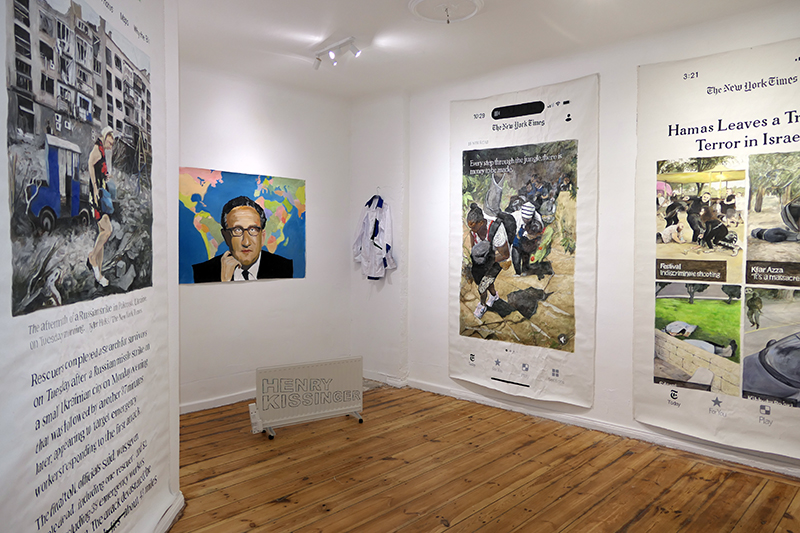
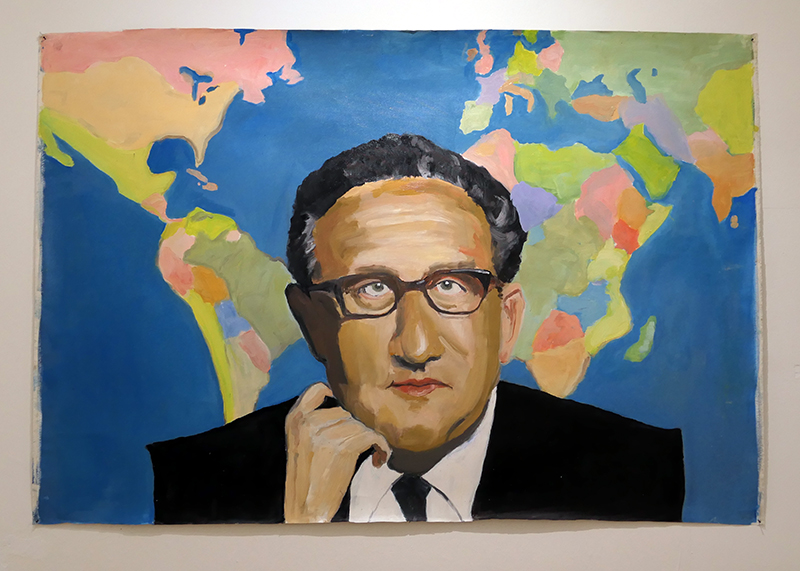
Henry Kissinger, 1923 -1933, 2023
oil on canvas 90 cm x 160 cm

installation view with an artist Martin Damman who has traded with me art works. he works for one of the most significant news aggregator
he gave a talk about the news and the brutality of the images.
the lady has been the director of a gallery and knew me from my early days as an educator in Stuttgart before they fired me ahead of time ---
thanks to Fee and Peng Xiangheng for performing in ths show with COMMEDESMARXISTS
note the back side of the "recycled" electro radiator as a comment to CLIMATE CHANGE and all the big promises to leave fossile fuels behind. Fee is Swiss and helped us - the artist run gallery DAUMENLUTSCHER - with natural products that are organic and keep us healthy. Her family has also a migration background from Africa, hence doubling up the core message of the show: we are all the same and there is no reason to discriminate anybody as well as we never know who is who. Henry Kissinger is a man who shaped the world as a global world of US hegemony and was rewarded for a peace nobel prize in 1974 for a war in the far East (Vientnam) he helped to start under a presidency that ended in an impeachment hearing and his resignation for the supression of vital documents concerning the war, the brutality and the futility of the war and its coverage.
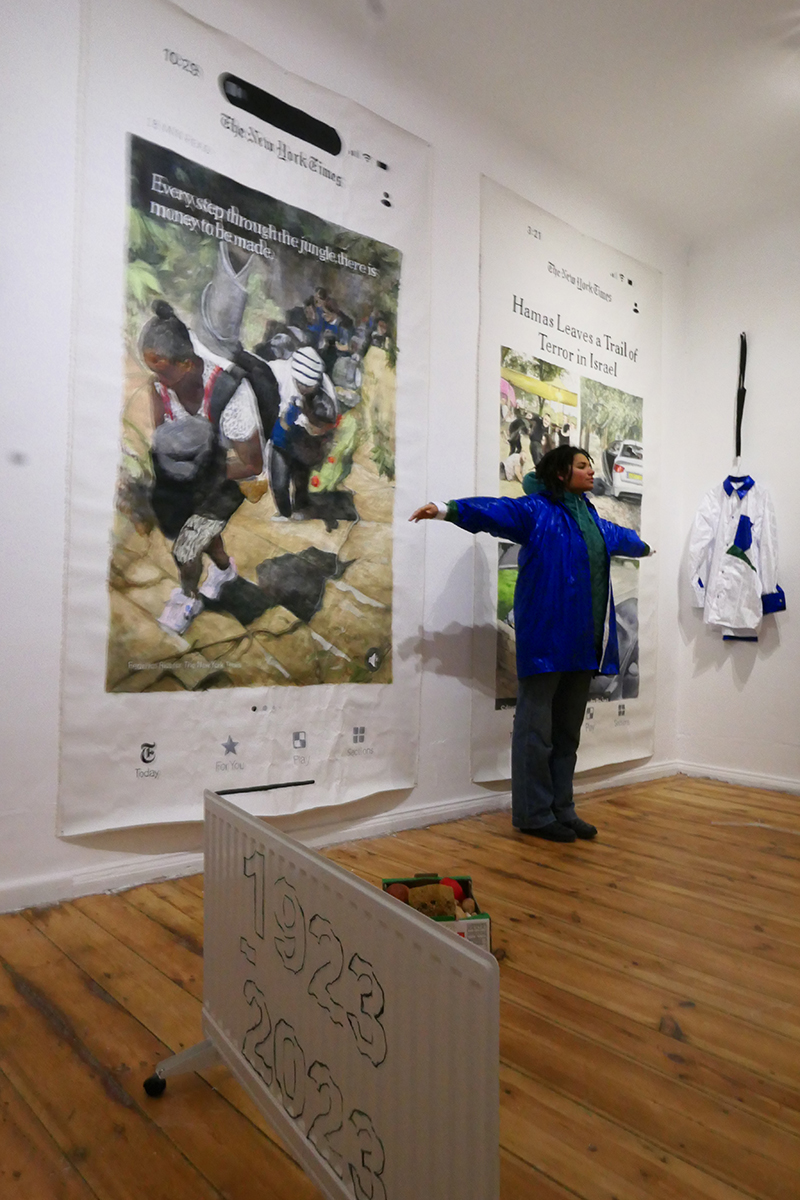
(the subtitle could also be HUNDRED YEARS OF FUEL AND WAR HEGEMONY enforced with all means including brutality, powerty inflicted enslavery and migration with tremendous climate change effects)

newspaintings, The New York Times, Every step through the jungle there is money money to be made. 2023
oil on canvas 302 cm x 166 cm
newspaintings, The New York Times, Hams Leaves a Trail of Terror in Israel, 2023
oil on canvas 302 x 166 cm
below:
newspainting, The New York Times, Russia-Urkaine, The aftermath of a Russian strike in Podrovsk, 2023
oil on canvas 302 x 166.5 cm
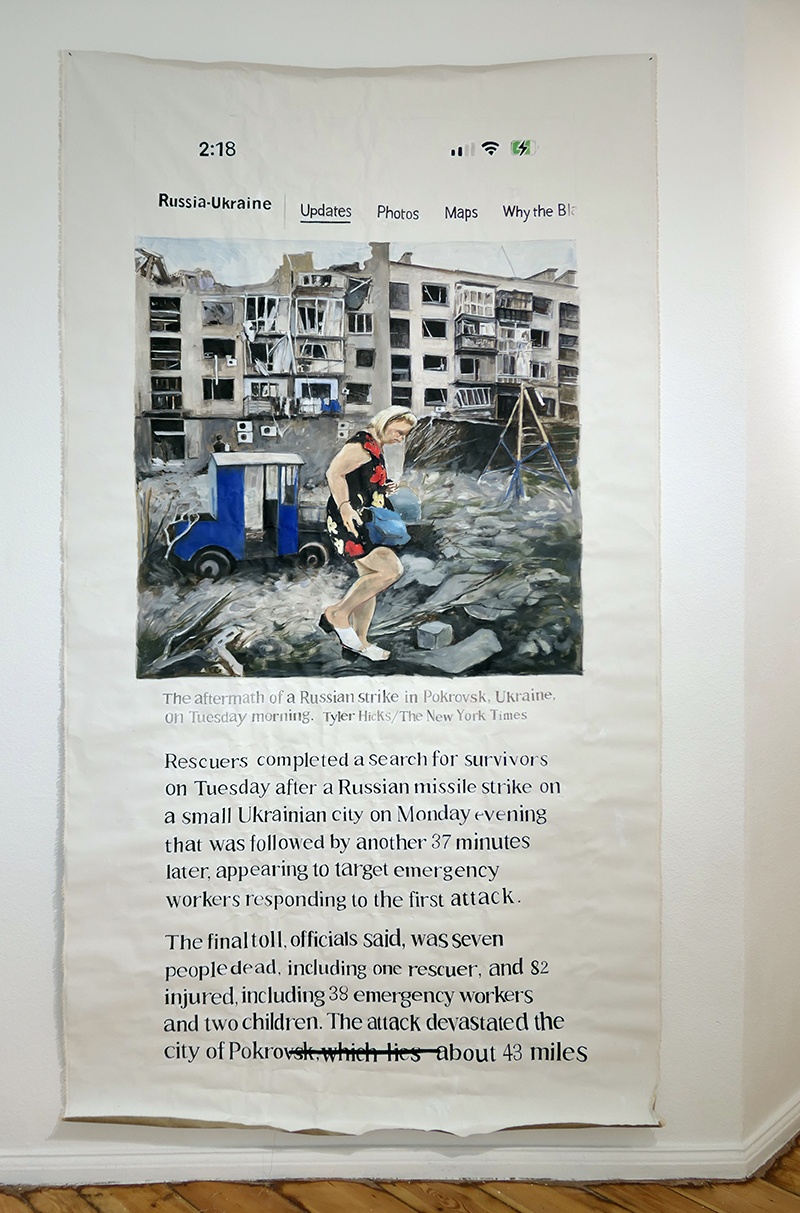
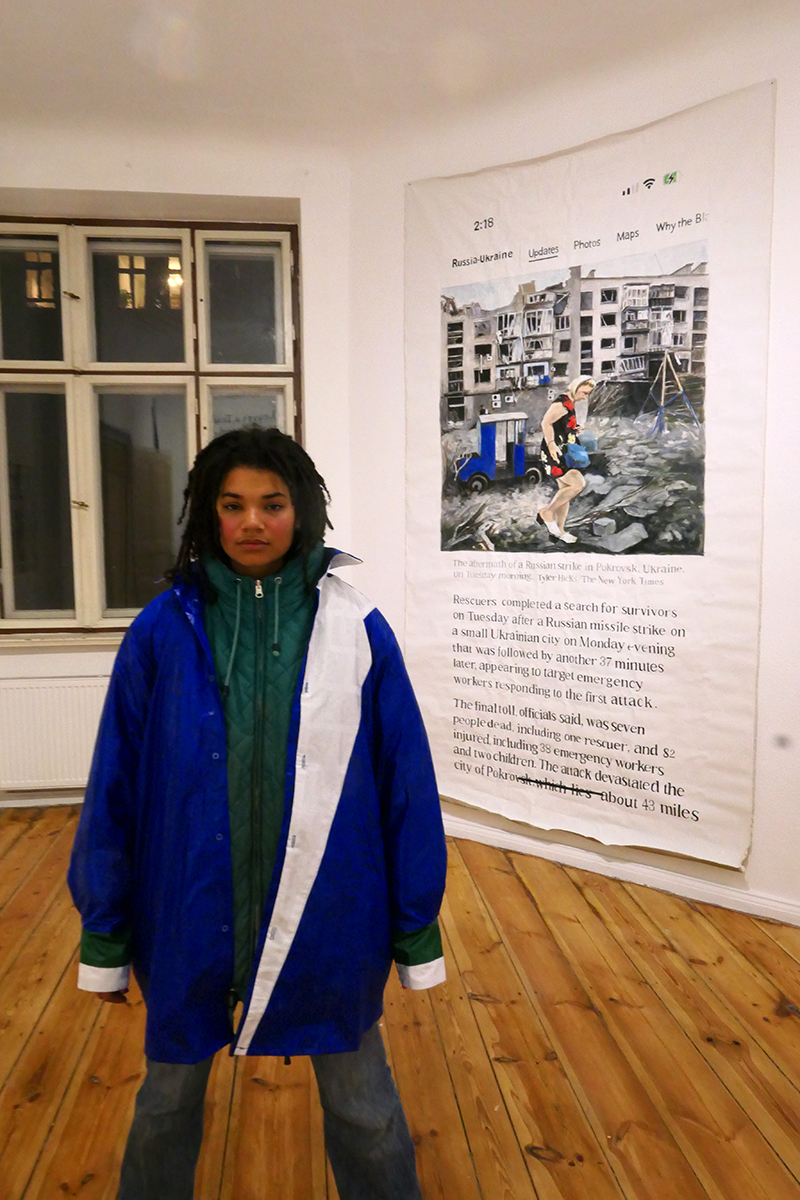
Marocco Quake Death Surpasses 2000, 2023
Oil on vanvas 66.5 x 43 cm
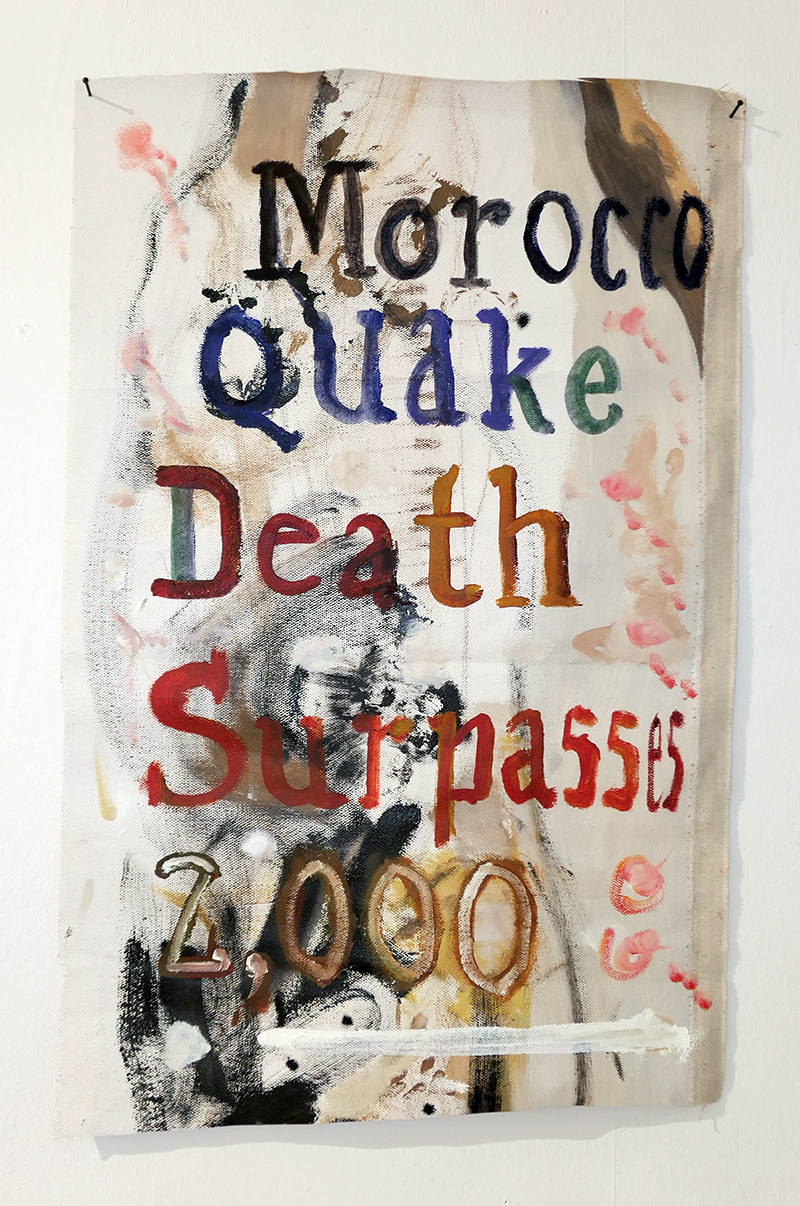
Kissinger, 2023
oil on a board, 51.5 x 41.5 cm
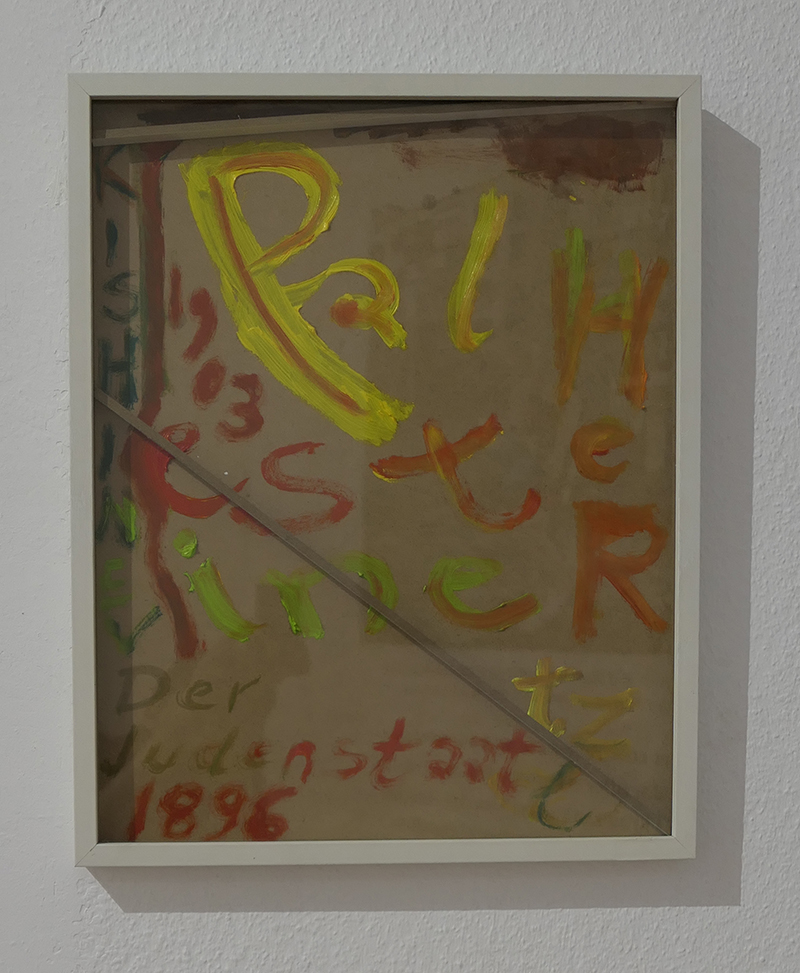

visiters - past and future artists (me with Peng Xiangheng, Xiaoxiao Li, and next show's artist at DAUMENLUTSCHER Yanka Smetanina (a refugee from Moscow)


I love Peng Canon Conversation, 2023
oil on canvas
286.5 x 163 cm
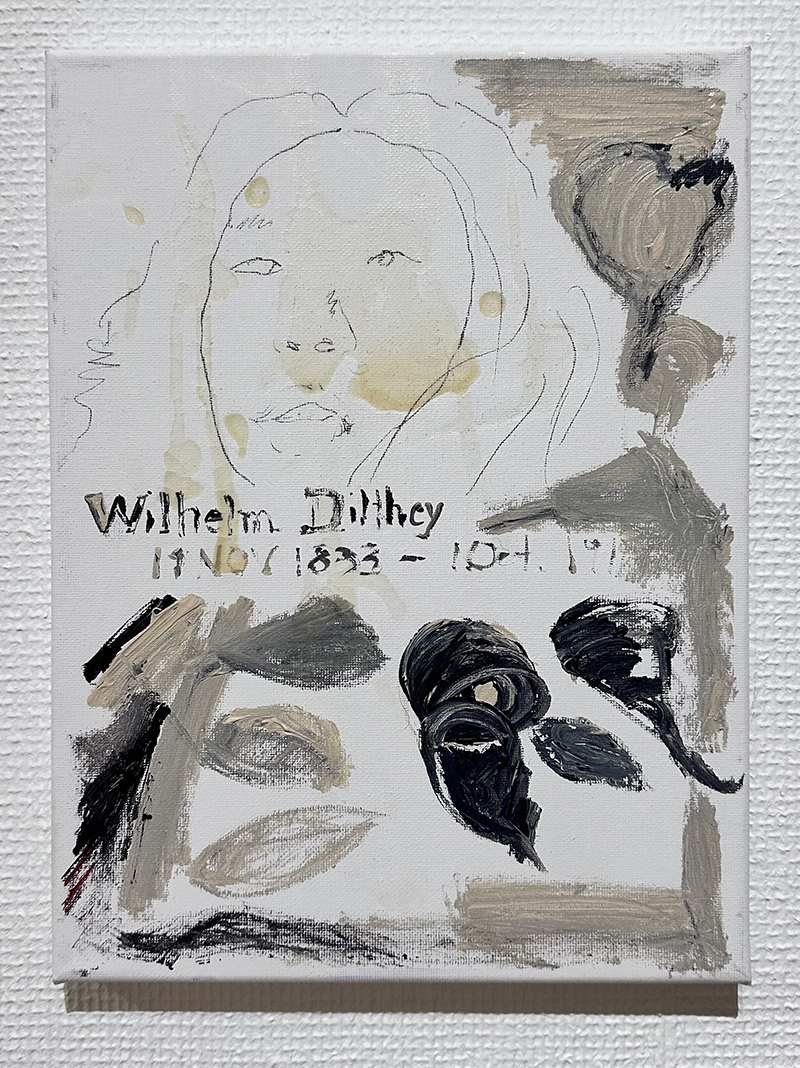
Wilhelm Dilthey, Weltanschauungslehre, for Peng, 2023
oil and other fluids on canvas, 30.5 x 23 cm
below:
IF (Basic Chinese) WAR Peace evasive ?, 2023
oil and other fluids on canvas, 31 X 22.5 cm
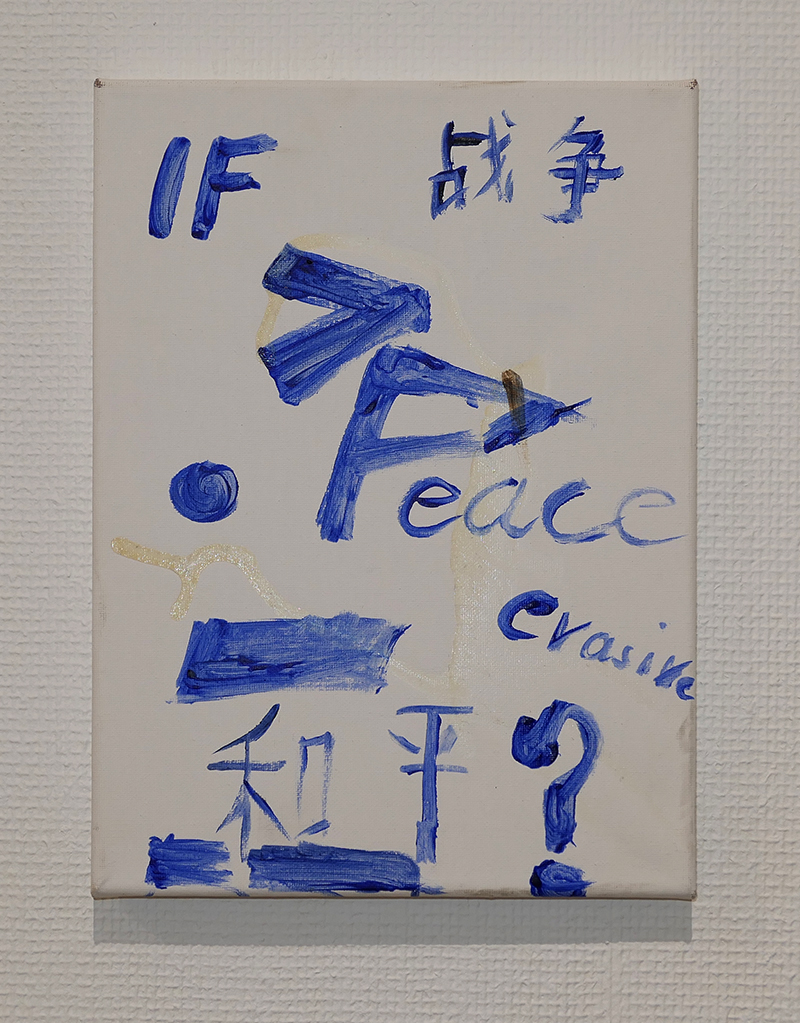
The Guardian, Israel-Hamas war, IDF closes in on Indonesian hospital in Gaza as 12 people reportedly killed, 2023
oil, graphite and acrylic on paper, 155 x 108 cm
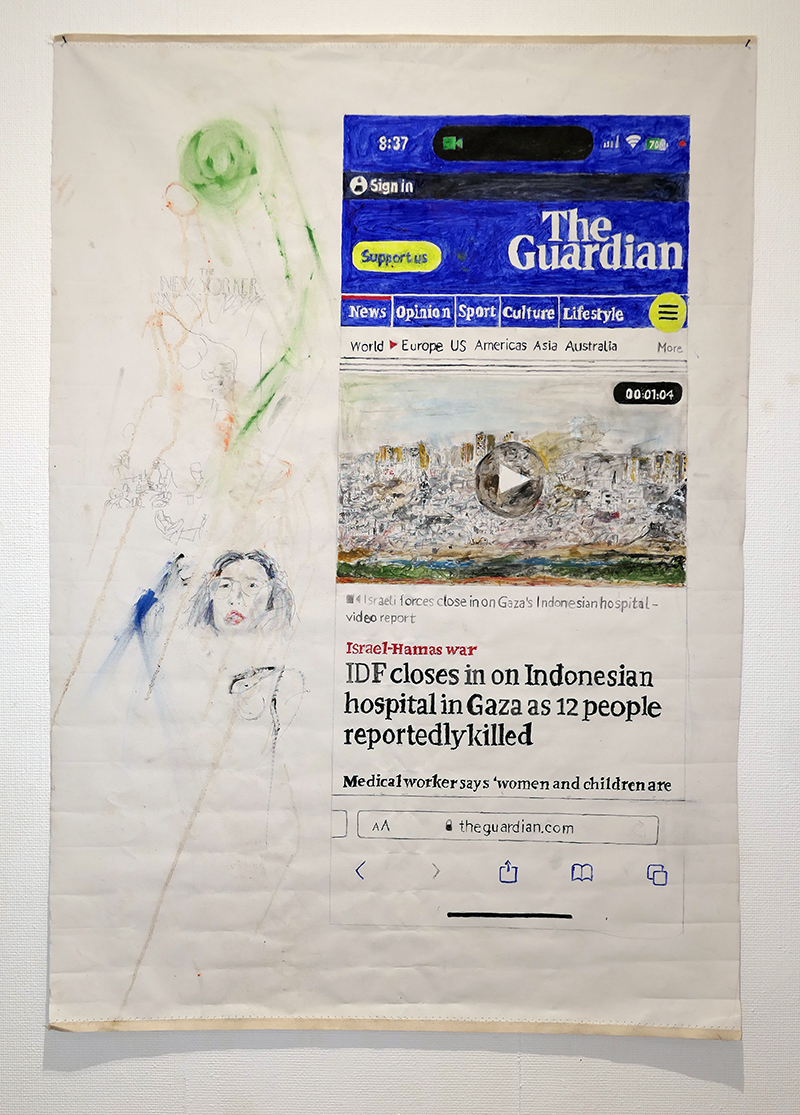
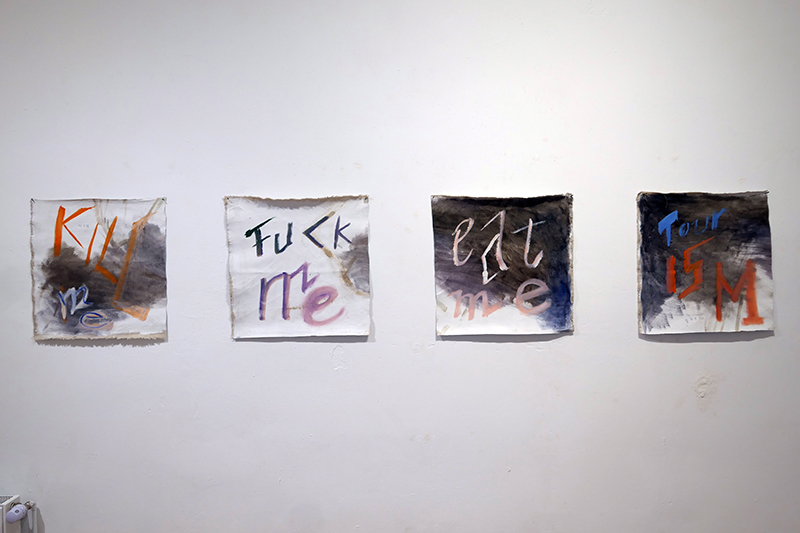
installation view
commedesmarxists

KILL me sorry, 2023
oil and ink on canvas 50 x 51 cm

eat me, 2023
oil and ink on canvas 52 x 52 cm

FUCK ME, 2023
52 x 52 cm
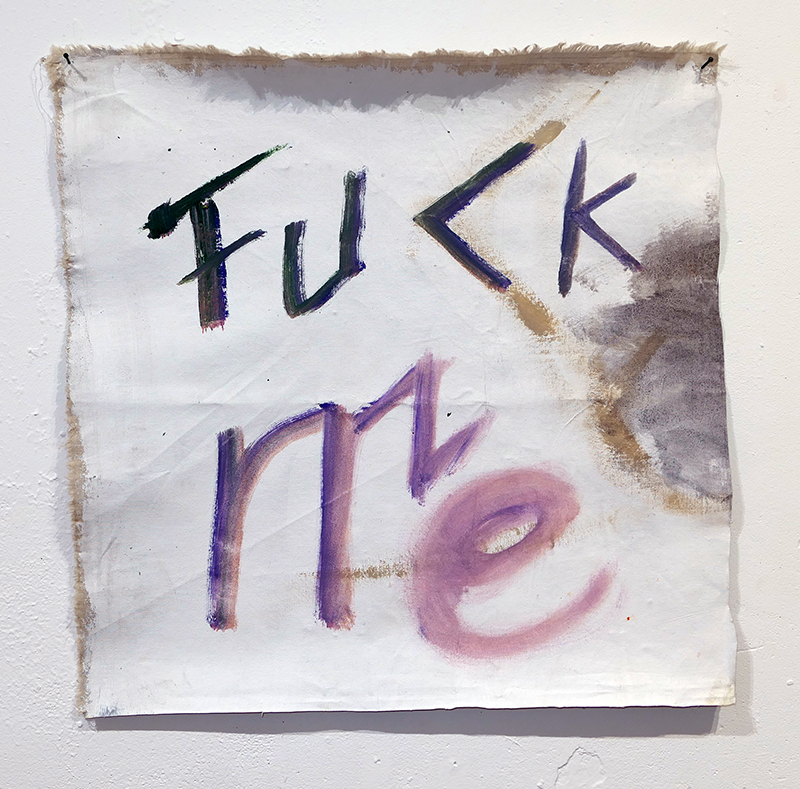
TOURISM, 2023
52 x 49 cm, 2023


thanks to the COMMEDESMARXISTS models - THANKS TO THE FlOWERS and their modelling
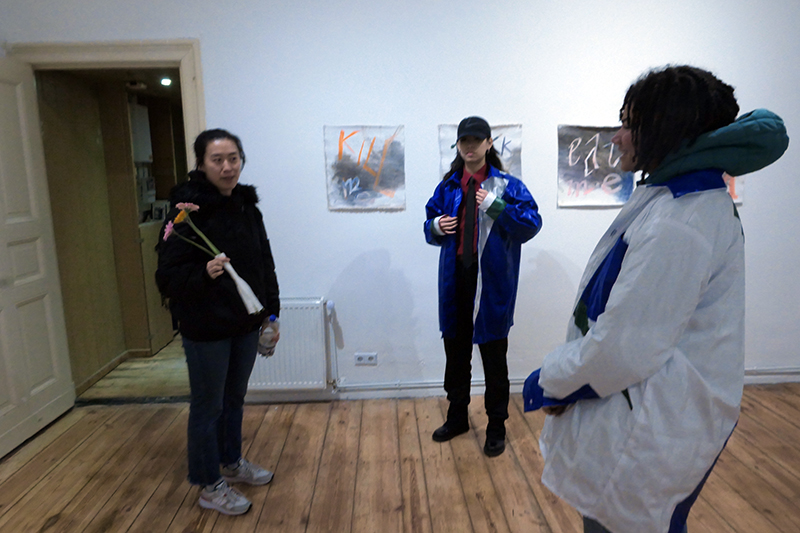
Seminar/Lecture, Thomas Kilpper on matters pertaining Henry Kissinger, December 9, 2023 Daumenlutscher opening Berlin
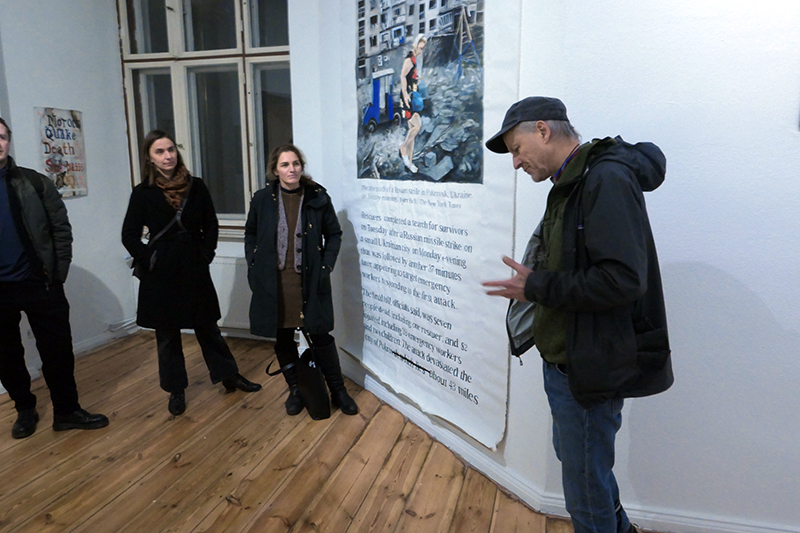
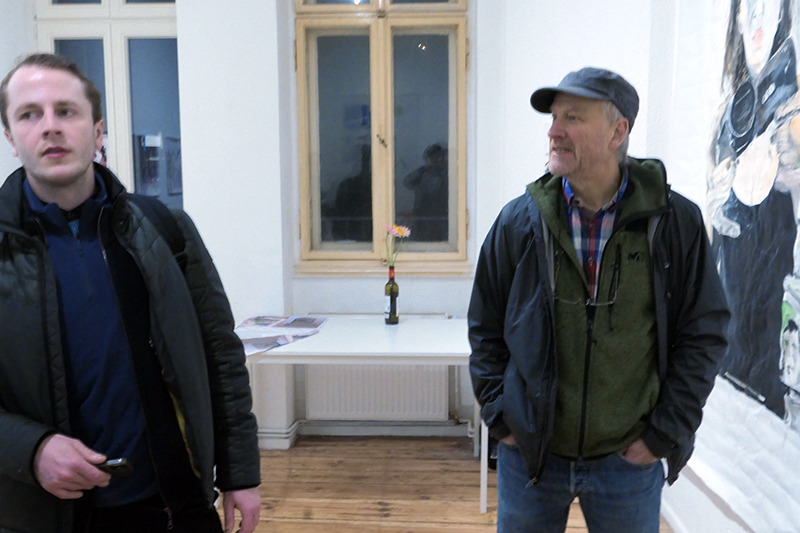

Seminar/Lecture, Thomas Kilpper on matters pertaining Henry Kissinger, December 9, 2023 Daumenlutscher opening Berlin
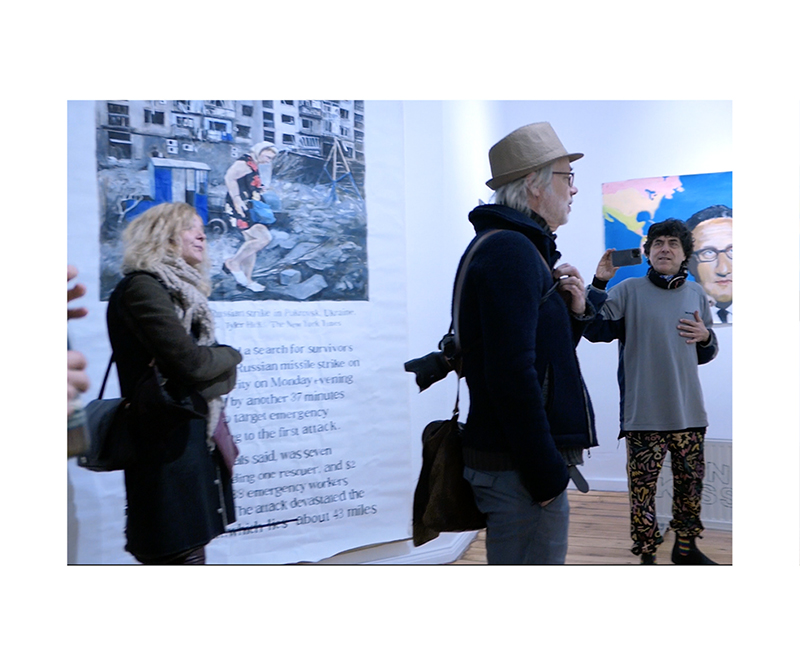
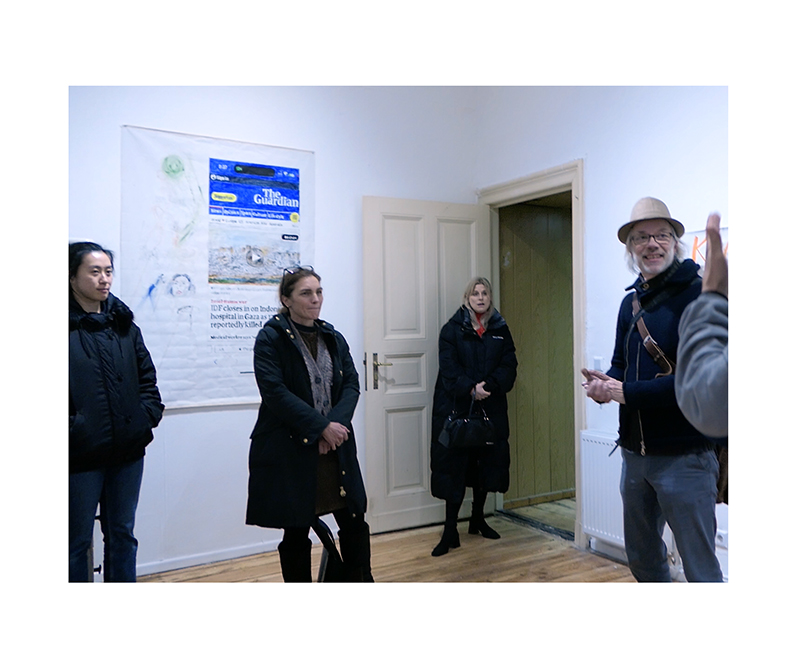
Seminar / Lecture, Martin Dammann on the brutality of war images, Daumenlutscher Berlin, 12/9/2023
photograph 20 x 24 inches. 51 x 61 cm
Musician, artist and singer and band leader Fabian Drung - he wil‚l be in the next DAUMENLUTSCHER group show in 2024



COMMEDESMARXISTS performances - 2023 with Peng Xiangheng and Fee
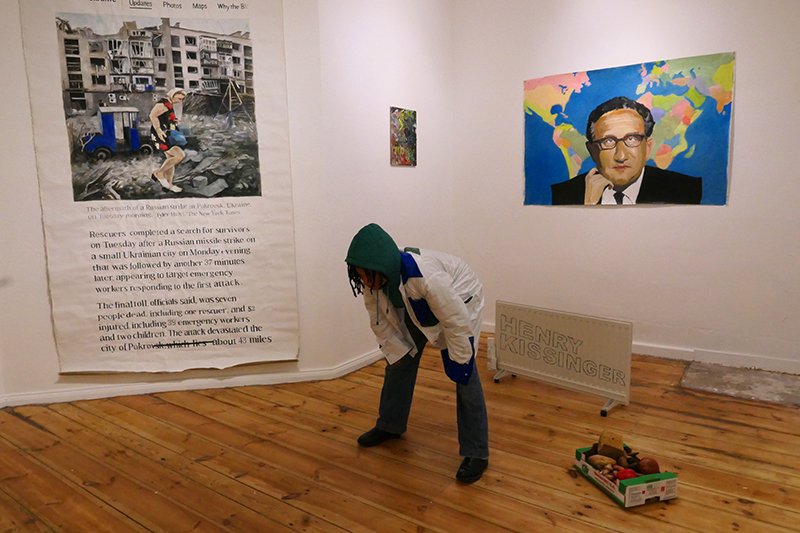
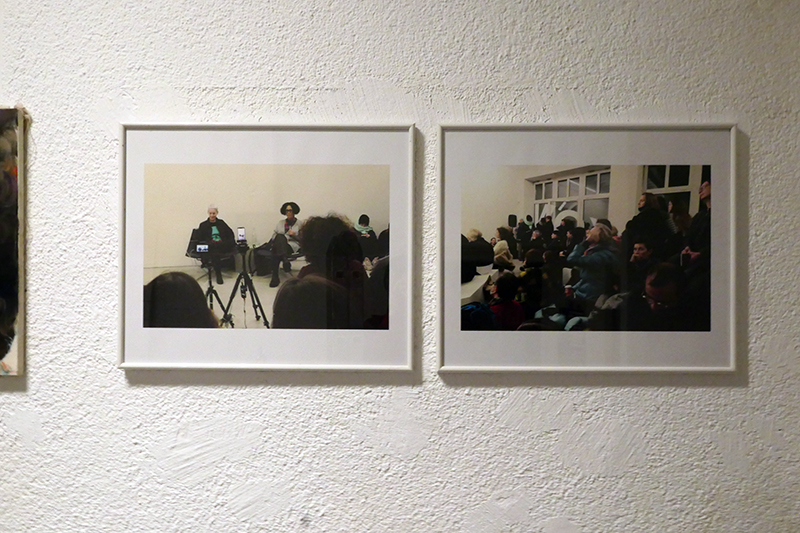
Seminar/Lecture, In Conversation, Candice Breitz, Coco Fusco, 12/ 06/2023, KOW Gallery, Berlin
2 photographs, 50 x 60 cm 2023 edition 1/4 plus 2 ap

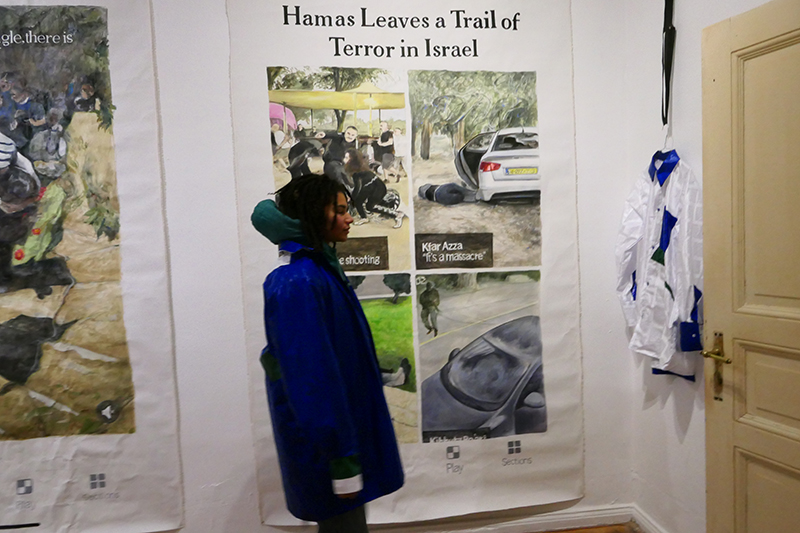
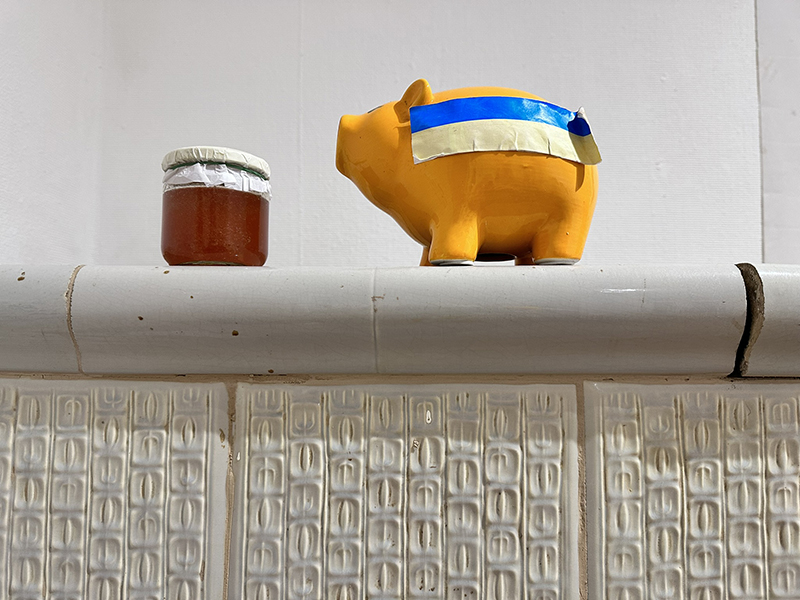
naturalien- to support the Ukarine- photograph - available for fundraising
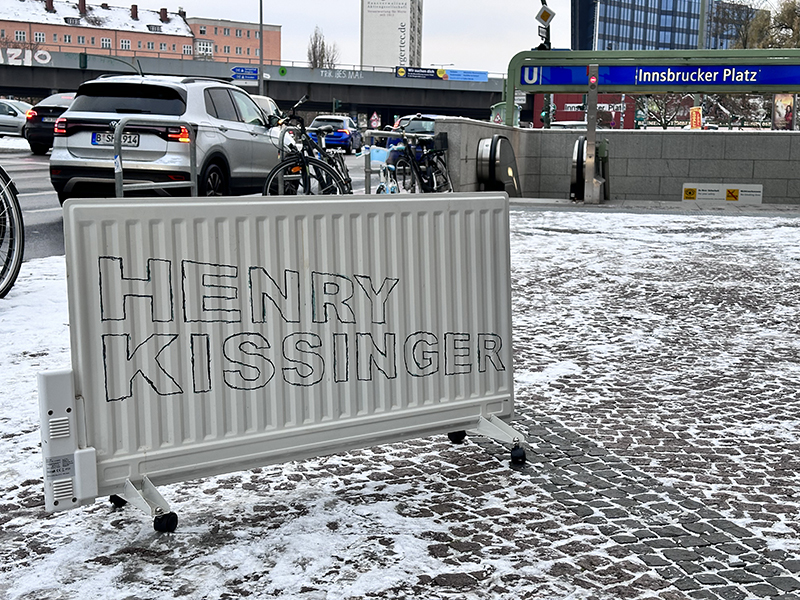


Peng Xiangheng - Daumenlutscher artist - performing for COMMEDESMARXISTS (a way to stay poor and lonely and miserable but patient to get justice in the end based on facts)
this web site was made during the time of war in the middle east, in the Ukraine and before the United Supreme Court ruling about the right to choose for women (abortion) - the questions whether Donald Trump is imune from all prosecution including criminal prosecution for his actions to illegally stay in office - hence we are living in a very, very critical time and Commedesmarxists is an outfit that advocates for democracy, for human rights and a free press. having said that i need to also state the fact that I am also in major critical moments in my life to go on with all decency and respect ... meaning able to pay bills and persuing courtcases successfully.
the RULE OF KINGS .... is not what anybody at daumenlutscher wants. The rule of the LAW but the law cannot be left in the hand of rioters or people like Putin or bombs, terror or random killings .... JANUARY 6, 2021.




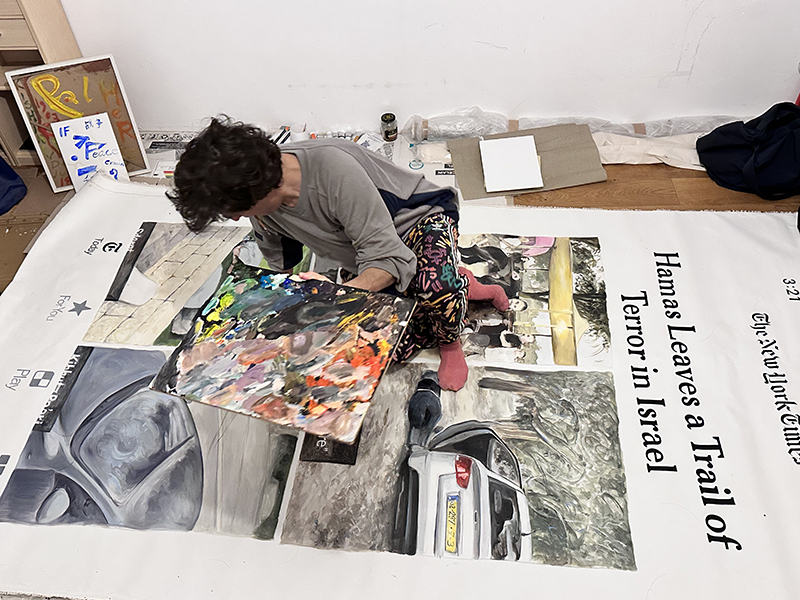

Daumenlutscher Berlin @daumenlutscher_berlin daumlenlutscher.info
RAINER GANAHL
Henry Kissinger
1923 -2023
Daumenlutscher is pleased to announce a solo show of Rainer Ganahl entitled “Henry Kissinger 1923-2023.” Opening: Saturday, December 9th 2023, 6-9 pm. The exhibition with last through January 27th, 2024.
Henry Kissinger, 1954 “Nuclear Weapons and Foreign Policy”. quotes taken from 3 different chapters, between p132 and p140 from original publication
p 136 - Part Two: TECHNOLOGY AND STRATEGY. Chapter 5: “The Price Deterrence? The Problems of Limited War”
“This is another way of saying that the threat of all-out war purchases deterrence at an exorbitant risk. It requires us in every crisis to stake our survival on the credibility of a threat which we will be increasingly reluctant to implement and which, if implemented, will force us into the kind of war our strategy should make every attempt to avoid. The costs of all-out war are too fearful for it to be our only response to a challenge. Even if it could be won, we should seek to achieve our objectives at smaller sacrifice. Strategy can assist policy only by developing a maximum number of stages between total peace (which may mean total surrender) and total war. It can increase the willingness of policy-makers to run risks only if it can demonstrate other means of preventing amputations than the threat of suicide.”
“The power of modern weapons has thus set our statesmanship a problem unique in our history: that absolute security is no longer possible. Justice of the majority of the citizens, at least in a democracy. (Even totalitarian regimes are so limited to some extent. To gain acquiescence they institute elaborate propaganda machines to achieve a consensus and a secret police apparatus to liquidate dissenters.) Foreign policy, on the other hand, is limited not only by technical feasibility, but also by the sovereign wills of other states which may have different criteria of justice and incompatible conceptions of their interests. At home, foreign policy is justified by the same criteria as domestic policy, for a nation has no other. Internationally, what is defined domes. “
p 140
… justice becomes an object of negotiation.
A limited war, by contrast, is fought for specific political objectives which, by their very existence, tend to establish a relationship between the force employed and the goal to be attained. It reflects an attempt to affect the opponent's will, not to crush it, to make the conditions to be imposed seem more attractive than continued resistance, to strive for specific goals and not for complete annihilation.”
p 255, 256 - Part Three: STRATEGY AND POLICY. Chapter 8: The Problem of Uncommitted powers
What of the relationship of the uncommitted part of the world to our coalition policy? It is often said that our policy of military alliances is one of the causes of our difficulties with the newly independent nations, and to a certain extent this is correct. We must be careful, however, not to confuse the symptom with the cause of our difficulties or to identify the policy toward the newly independent states with a quest for popularity.
The importance of the newly independent nations cannot be doubted. It is equally beyond question that it is to the American interest that we identify ourselves with their hopes and aspirations and that we seek to prevent an alignment of the white against the colored races of the world. The consequences that flow from this realization are much less obvious, however. Any discussion of policy toward the uncommitted third of the world must, there-fore, begin with an examination of the tendencies they represent, even at the risk of some digression.
The revolution that is taking place in the newly independent and still dependent states can only be narrowly understood as a revolution against colonialism. In a real sense, it is a continuation of a revolution started by the colonial powers and carried on under their aegis. More-over, not all the protest movements of formerly subjugated people are either of the same order, nor do they all represent the same phenomenon: there is a basic difference between areas in which colonialism ruled directly and those in which it governed indirectly.
The remarkable aspect of colonialism from its beginning was the imposition of rule by a very small group of Europeans over vast populations. This was due not so much to the military superiority of the West-in many respects it is greater today than it was in the nineteenth century-as to the fact that the European powers displaced an existing ruling group in a society where the vast majority of the population neither enjoyed nor expected direct participation in government. The structure of government in what is now the uncommitted third of the world had been feudal for centuries, and in their first appearance the Europeans appeared as a new governing group substituting itself for the existing one according to a pattern which had characterized these areas for many generations. The domination of vast territories by small groups of Europeans was possible precisely because they were not considered as"foreign; the notion of their foreignness was introduced in the first instance not by the governed but by their rulers.
For the Europeans were not content with displacing a feudal upper class. They brought with them the twin doctrines of rational administration and popular participation in government, which in time had inevitably to prove inconsistent with their continued domination. The rationalizing of administration led to the consolidation of many areas into viable units for the first time in their history:Indonesia, for example, was nothing but a geographic expression until the Dutch found it more efficient to unite the islands of the Indies under a single administration.At the same time the colonial powers trained a group of indigenous leaders in European universities where they absorbed the doctrines of the right to self-government, human dignity and economic advancement which had been the rallying points for European revolutionary and progressive movements throughout the nineteenth century.
The result was two sets of paradoxes: in its revolutionary aspect colonialism represents one of the greatest conversions of history. Almost without exception the leaders of the newly independent states, as well as the heads of anti-colonial uprisings in still dependent countries, are opposing their present or former masters in terms of values they have learned from them. Their challenge to the West is not in terms of a different set of beliefs; on the contrary, they are demanding that the West live up to its own principles. The leaders in the uncommitted third of the world are playing a role drawn from a Western script. As the ideals of the British, French and American revolutions became diffused, partly through the very spread of colonialism, the seeds were sown for the destruction of colonialism itself. The more successful the teachings of the colonial powers, the more untenable their positions became. Thus the greater the participation of the indigenous population in their own government, the more insistent grew their demands for independence, as is demonstrated by the difference between the British and the Portuguese colonies. What is taking place in the areas once under direct colonial rule is the second stage of the revolution started by the colonial powers. It is an attempt by the leaders of the newly independent states to spread among the masses of their people the values which they themselves acquired from the colonial power and which furnished the original impetus of the revolution.
Rainer Ganahl just closed his 13th one person show in New York City where the struggling artist has to deal with very complicated personal and professional circumstances including bankruptcy, police harassment, repeated arrests, forced psychiatric hospitalizations due to unnecessary calls to the hospital by a former girl friend and the subsequent termination of his tenure as a professor of fine art due to this unwanted psychiatric commitment, used by a competitor of another former girl friend after the artist was nearly killed by a swinging black latino skate board driver who considered him a gentrifier in Harlem simply biking in front of his place he is about to lose due to financial hardship.
Related to all the artist’s reason to solely focus on negative news is his fight to have a roof over his head, to see his young children, Edgar and Isadora Ganahl who he has not been able to speak to for many years due to the intensity of the domestic quarrel. He loves the number One Hundred because of the fact that Family Court rejected visitation based on the fact that he was reading with the children Garcia Marquez’s classic “A Hundred Years of Solitude,” considered “adult literature” and “insane.” This book appeared in Europe at the time when the high schooler was working as an exploited cheap laborer in Switzerland’s restaurant industry, Moevenpick, in the position of a nightly cleaner of the kitchen, the freezing rooms and the rest of the rather large restaurant that made him vomit and finally sick so he could be fired. At that time, decades ago, Ganahl was choosing Lausanne during his high school summer holidays of a college that specialized in business (Handelsakademie - Rainer Maria Rilke attended one as well) as a “sans papier” (without any legal papers) but with the intention to improve his French, to sharpen his mind in questions of economic justice and to repurchase a photo camera which was previously stolen during a Bob Marley concert in Barcelona where he attended a Spanish language school.
It was the “100 years of age” and the particular stunning career of the social scientist, politician and military man Henry Kissinger that settled on a show title for the first one person show at the collectively run Berlin art gallery Daumenlutscher. Ganahl has chosen as a show title “HENRY KISSINGER, 1923 - 2023” because he reached this inspiring living age in spite of his stressful past as a German Jewish emigrant who never gave up fighting against totalitarian regimes albeit of the consequences. Kissinger was a Holocaust survivor and actively involved in the denazification process of Germany. He also volunteered to the front theater of World War II and worked for the Counter Intelligence Corps to identify significant Nazi figures. He was involved in some of the famous Nazi War crime trails. Kissinger’s parents were orthodox Jews who had parts of their family - grand parents and cousins who were not able to escape Shoa - killed in camps. He and all members of his southern German birthplace were exposed to a progrom, to beatings and public humiliations even before Kristallnacht in November of 1938. After that event, there was no doubt for an illusion of hope for the Kissinger family to exist in Germany while the Hitler regime was in power. Ganahl, trained also as a historian took notice of Kissinger’s Harvard dissertation on the question of peace treaties in the post French Revolution European wars under the title : “Metternich, Castlereagh and the Problems of Peace 1812 - 1822.” In that Harvard Department of Government 1957 dissertation Kissinger researched how the Austrian minister and the British Foreign Secretary helped to bring about peace, political stability, and legitimate authoritarian order in post-Napoleonic Europe.
Kissinger's viewpoint regarded the international system as "legitimate" because it was accepted by the leaders of all five Great Powers of Europe. Notably, Kissinger's Primat der Außenpolitik (Primacy of foreign policy) approach to diplomacy took it for granted that as long as the decision-makers in the major states were willing to accept the international order, then it is "legitimate" with questions of public opinion and morality dismissed as irrelevant. Hence from the legal, political, historical, economic, social, ethnic and when it comes to colonies from the post-colonial approach Kissinger was a US State “Real Politiker” who was striving for peace, US hegemony with the use of alliances, giving Nato, the United Nations and other international bodies a prime role in sharing responsibility in loss and success. His shared believe in liberal democratic systems was unfortunately not always his prerogative given the fact that he educated masses of south American and Asian dictators who were killed in the name of fighting Socialism and Communism. It is very, very sad that in the last 100 years nearly nothing has changed when it comes to anti-semitism and anti-islamism and the brutal repercussion of brutal war by leaders around the world who think they have iron dromes and can guarantee absolute security which is a total illusion.
Unfortunately, even the United States under Trump nearly experienced the extinction of the democratic experiment not ignoring the Ukraine war, the war in the Middle East that might broaden if it continues and co-existence is not an option, a principle that is also applicable to the power in the South East Asian Sea. All parties involved in the international gallery DAUMENLUTSCHER agree, the world could be reflected and understood along the texts of Henry Kissinger who currently only evokes bad memories by most Europeans and liberals in the USA and abroad. His power in Washington was biggest during the second half of the Cold War years, hence during the 1960s and 1970s when he was in President Nixons’s cabinet working to start wars and to end wars when they could not be won, collecting even a Peace Nobel price. The Nobel Peace Prize 1973 was awarded jointly to Henry A. Kissinger and Le Duc Tho "for jointly having negotiated a cease fire in Vietnam in 1973" Le Duc Tho declined the Nobel Peace Prize. Kissinger enjoyed it. What is less know is the fact that he was also involved in negotiating the end of the Cold War, in founding German Universities and allowing the transfer of the German Capital from Bonn to Berlin and the big role he played to enable China back into the international community.
By now, the reader of this press releases should understand that the Ganahl’s work in this show is political and private at the same time. He is concerned and personally implicated through his kids in the war against Russia in the Ukraine and the Gaza war. Educated by war traumatized beating teachers and parents the artist picked a route of endlessly studying foreign languages and other matters including fashion. Note, for about a decade he has his sustainability fashion brand called “commedesmarxists” thought he is not believing in a communist or socialist future of the world and rather sees in all religion and believe systems problems the moment they become powerful and compete with each others.
Henry Kissinger’s Phd was concerning the use of nuclear weapons and its application in foreign policy. The former Harvard political scientist and professor answered with a still super influential book that proves its relevance today. The artist shared Kissinger’s believe in the danger of nuclear power and appreciates studying Kissinger’s classical COLD WAR WORK entitled “Nuclear Weapons and Foreign Policy.” While this press release is composed by DAUMENLUTSCHER, Nuclear facilities are under threat of incoming bombs in the Ukraine and in Israel which officially has not acknowledged to be a nuclear nation. Today’s headline in the New York times reads “Militant Rocket Hit Base Linked to Israeli Nuclear Program” showing the ferocity of the current war in a land that was created as an answer to the Nazi regime and Anti-Semitism that has it s origin as early as Christianity was adopted as a state religion by some roman emperor.
The work list contains paintings in all sizes plus one sculpture that is entitled “Henry Kissinger, 1923 -2023”
Gallery hours of Daumenlutscher are every Saturday 3 - 6 pm and by appointment.
Emserstr 46, 12051 Berlin, Neuköln
curator ALEKSANDRA
daumenlutscher@yahoo.com
+49 176 87514730
